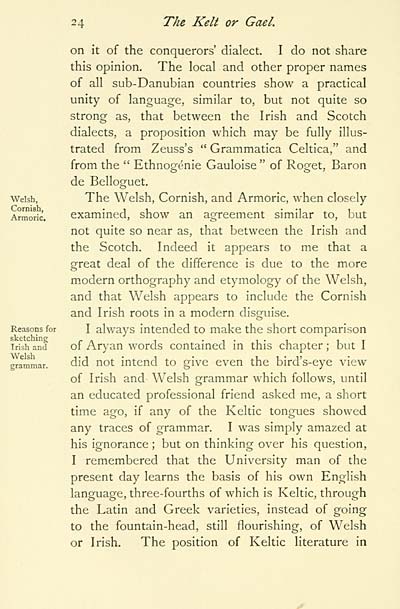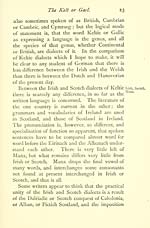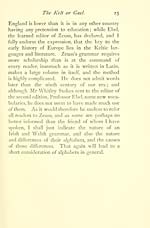Blair Collection > Kelt or Gael
(28)
Download files
Complete book:
Individual page:
Thumbnail gallery: Grid view | List view

'■4
The Kelt or Gael.
on it of the conquerors' dialect. I do not share
this opinion. The local and other proper names
of all sub-Danubian countries show a practical
unity of language, similar to, but not quite so
strong as, that between the Irish and Scotch
dialects, a proposition which may be fully illus-
trated from Zeuss's " Grammatica Celtica," and
from the " Ethnogenie Gauloise" of Roget, Baron
de Belloguet.
The Welsh, Cornish, and Armoric, when closely
examined, show an agreement similar to, but
not quite so near as, that between the Irish and
the Scotch. Indeed it appears to me that a
great deal of the difference is due to the more
modern orthography and etymology of the Welsh,
and that Welsh appears to include the Cornish
and Irish roots in a modern disguise.
I always intended to make the short comparison
of Aryan words contained in this chapter ; but I
did not intend to give even the bird's-eye view
of Irish and Welsh grammar which follows, until
an educated professional friend asked me, a short
time ago, if any of the Keltic tongues showed
any traces of grammar. I was simply amazed at
his ignorance ; but on thinking over his question,
I remembered that the University man of the
present day learns the basis of his own English
lanofuaofe, three-fourths of which is Keltic, throuo-h
the Latin and Greek varieties, instead of going
to the fountain-head, still flourishing, of Welsh
or Irish. The position of Keltic literature in
The Kelt or Gael.
on it of the conquerors' dialect. I do not share
this opinion. The local and other proper names
of all sub-Danubian countries show a practical
unity of language, similar to, but not quite so
strong as, that between the Irish and Scotch
dialects, a proposition which may be fully illus-
trated from Zeuss's " Grammatica Celtica," and
from the " Ethnogenie Gauloise" of Roget, Baron
de Belloguet.
The Welsh, Cornish, and Armoric, when closely
examined, show an agreement similar to, but
not quite so near as, that between the Irish and
the Scotch. Indeed it appears to me that a
great deal of the difference is due to the more
modern orthography and etymology of the Welsh,
and that Welsh appears to include the Cornish
and Irish roots in a modern disguise.
I always intended to make the short comparison
of Aryan words contained in this chapter ; but I
did not intend to give even the bird's-eye view
of Irish and Welsh grammar which follows, until
an educated professional friend asked me, a short
time ago, if any of the Keltic tongues showed
any traces of grammar. I was simply amazed at
his ignorance ; but on thinking over his question,
I remembered that the University man of the
present day learns the basis of his own English
lanofuaofe, three-fourths of which is Keltic, throuo-h
the Latin and Greek varieties, instead of going
to the fountain-head, still flourishing, of Welsh
or Irish. The position of Keltic literature in
Set display mode to: Large image | Transcription
Images and transcriptions on this page, including medium image downloads, may be used under the Creative Commons Attribution 4.0 International Licence unless otherwise stated. ![]()
| Early Gaelic Book Collections > Blair Collection > Kelt or Gael > (28) |
|---|
| Permanent URL | https://digital.nls.uk/75786992 |
|---|
| Description | His ethnography, geography and philology. |
|---|---|
| Shelfmark | Blair.17 |
| Additional NLS resources: | |
| Attribution and copyright: |
|
| Description | A selection of books from a collection of more than 500 titles, mostly on religious and literary topics. Also includes some material dealing with other Celtic languages and societies. Collection created towards the end of the 19th century by Lady Evelyn Stewart Murray. |
|---|
| Description | Selected items from five 'Special and Named Printed Collections'. Includes books in Gaelic and other Celtic languages, works about the Gaels, their languages, literature, culture and history. |
|---|

